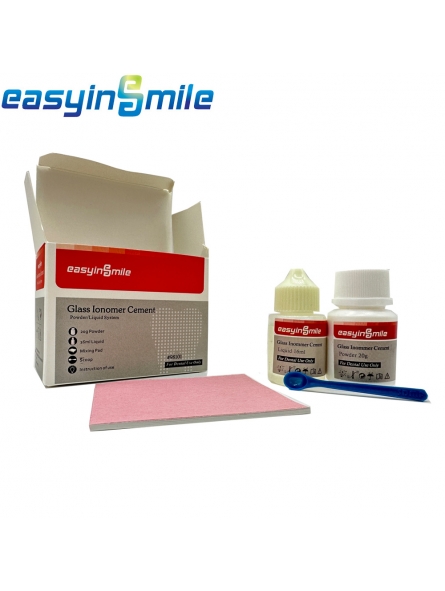Dental Glass Ionomer Cement Product Benefits:
· Self curing and Self adherent
· Universal shade to achieve desired natural aesthetics
· Radiopaque and offers strong adhesion to enamel and dentin
· High and continuous fluoride release inhibits secondary caries
· Coefficient of expansion similar to tooth structure
· Simple handling, reliable quality and constant working properties
DENTISTS USE THIS CEMENT TO PERMANENTLY FIX:
· Caps
· Crowns & bridges
· Veneers
· Crown posts
· Lost dental fillings
. Orthodontic Bands
Indications:
· Permanent fixation of veneers
· Permanent fixation of crowns & bridges
· Permanent class III, class V restorations and small class fillings
Restoration of deciduous teeth especially class I
· Primary teeth fillings
· Fissure sealing
· Fillings of cervical erosions
· Fillings prior to crown preparation
Composition:
· Powder : Calcium-alumino-flourosilicate
· Liquid : Polyacrylic acid
Features:
GlC sets within 6-8 minutes from the start of mixing, setting time is
lesser for Type I materials than Type II materials. The setting can be
slowed when the cement is mixed on a cold slab but this technique has
an adverse effffect on strength.
Technical parameters & packing list:
Do bottom material Compressive strength: >=50Mpa
Do fifilling material Compressive Stength: >=100Mpa
Packing list:
#2 20g / bottle *1pcs
Liquid 16ml*1pcs
Simple, Easy to use, Affordable Dentist Clinic Pack.
Glass ionomer cement (GIC) is a dental restorative material used in
dentistry for dental fifillings and luting cements. These materials are
based on the reaction of silicate glass powder and polyalkenoic acid,
an ionomer.
What is glass ionomer cement?
Glass ionomer cement is a kind of dental cement that was developed in 1965 and began to be used in restorative dentistry in 1972. Made of a silicate glass powder combined with a water-soluble polymer, these cements are also called "giomers." They are used to permanently cement dental inlays, bridges, crowns and orthodontic brackets and to fill cavities. The cement is popular because it adheres to enamel and dentin and has the same natural color as teeth. In addition, glass ionomer cement releases fluoride ions, which are beneficial to the teeth.
However, giomers are brittle and cannot be used in load-bearing areas. As of the 1990s, new formulas with higher powder-to-liquid ratios have been introduced, and these are slightly stronger. Studies have shown giomers to have 90 percent retention over a 10-year period. For optimal bonding, the tooth surface should be conditioned with polyacrylic acid before application of the cement. Glass ionomer cements are classified based on what they are used for. Type I giomers are used as adhesives for attaching dental crowns, bridges and prostheses.
Type II are used as restorative materials, and type III are used for lining and sealing. If traditional giomers are to be used in a higher-stress area of the mouth, they must be protected by an amalgam or a resin composite. This is sometimes called the "sandwich technique" because the giomers are sandwiched between the tooth and whatever restorative material is being used. A more recent innovation is resin-modified glass ionomer cement, which forms an even stronger bond with dentine than traditional giomers do. While the final color of all giomers (traditional and resin-modified) depends on what polishing technique the dentist uses, it’s possible they might discolor after some time.









